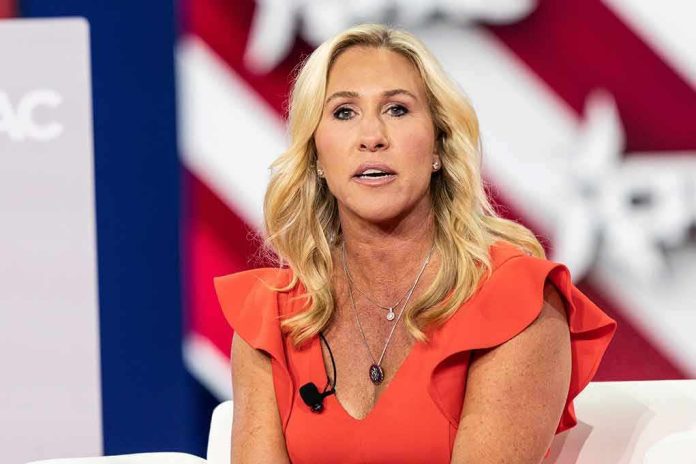
When a sitting president’s words become so personal that a member of his own party claims her life is at risk, the boundaries of political loyalty, personal safety, and public spectacle get redrawn in real time.
Story Snapshot
- Rep. Marjorie Taylor Greene asserts that Donald Trump’s criticism has endangered her safety.
- Trump’s abrupt withdrawal of endorsement intensifies an already public rift inside the GOP.
- Greene’s claim reframes the consequences of political feuds in the digital age.
- This episode highlights the shifting terrain of loyalty and risk in American politics.
Trump’s Public Rebuke and Greene’s Warning Shot
Donald Trump’s decision to pull his endorsement from Rep. Marjorie Taylor Greene marked a stunning escalation in the ongoing feud between two of the Republican Party’s most prominent figures. Greene, no stranger to controversy herself, responded with a direct accusation: the president’s public criticism had “put my life in danger.” This claim, delivered with characteristic bluntness, reframed a political spat as a matter of personal security—raising the stakes for both the individuals involved and the party they represent.
Trump’s withdrawal of support did not come out of nowhere. The build-up included days of pointed messages exchanged online, with Greene firing off sharp retorts and Trump responding in kind. Their feud, simmering for months, reached a boil when Trump, late on a Friday, made the rare move of rescinding his endorsement—a public signal that Greene was now persona non grata in his camp. Within hours, Greene issued her statement, warning that Trump’s words had real-world consequences, including threats to her personal safety.
The Anatomy of a Political Feud in the Digital Era
What distinguishes this confrontation is not just the sharpness of the rhetoric but the way it unfolded in full view of the public, amplified by social media and a 24-hour news cycle. Greene’s assertion that her life is now at risk because of Trump’s remarks invites scrutiny into how political disagreements, when aired so publicly, can escalate beyond policy differences or electoral strategy. The digital megaphone available to both politicians and their followers blurs the line between political theater and personal jeopardy. In this age, a tweet or a post does not stay confined to the political class; it reverberates across the country, sometimes mobilizing fervent supporters who may take inflammatory rhetoric literally.
The episode forces a reevaluation of what it means to “endorse” or “disavow” in a climate where loyalty is both demanded and policed in real time. The speed with which this feud escalated, and the personal nature of Greene’s response, reflects a broader trend: American political discourse is increasingly shaped by public confrontations that quickly devolve into matters of safety and survival, not just policy or principle.
The Consequences for Party and Country
Greene’s charge that Trump’s criticism “put my life in danger” is not just a personal lament—it is a warning about the direction of political engagement in America. When personal safety becomes a talking point in partisan disputes, the implications reach far beyond the individuals involved. This case underscores the risks inherent in the current environment, where digital platforms magnify every disagreement and turn private disputes into public spectacles. For the Republican Party, the feud exposes fault lines that are not easily papered over, raising questions about who gets to define loyalty and how that definition can shift overnight.
The long-term impact of this episode remains to be seen. Will other political figures now hesitate before criticizing allies, fearing similar accusations and consequences? Or does this moment simply mark another escalation in an era where outrage is currency and personal grievance carries as much weight as political ideology? As the dust settles, one thing is clear: the boundaries of political discourse, loyalty, and personal risk have shifted, perhaps permanently, in the American political landscape.
Sources:
Trump withdraws his support for Rep. Marjorie Taylor Greene



